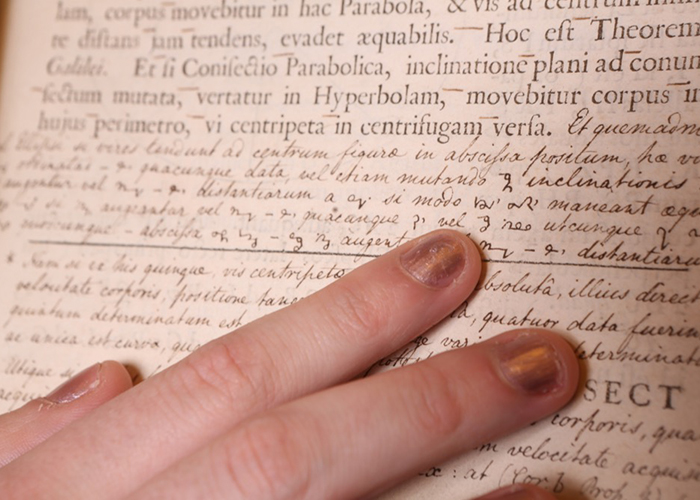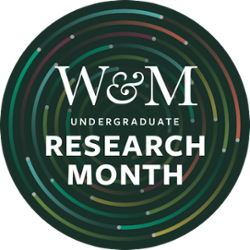William & Mary’s second annual Undergraduate Research Month will start April 1 – and this time it will be primarily on campus and in person.
Last April, amid the COVID-19 pandemic, Dan Cristol, the director of faculty-mentored undergraduate research at the university’s Roy R. Charles Center for Academic Excellence, spearheaded W&M’s first-ever month-long digital showcase of undergraduate research. This year, as COVID-19 case levels have declined regionally and nationally, Cristol is excited to bring the event from the virtual realm into the non-digital world.
“This is an in-person event this year,” Cristol said. “Some programs may have streaming and we have virtual back-up plans, but for the most part, it’s really about being together after all this time apart.”
This year’s slate of events will feature work from a wide array of disciplines, many hosting workshops and showcasing student projects for the first time. Also new this year is a research-oriented career fair and an undergraduate writers’ retreat. Cristol has made it a priority to define “research” broadly by including accomplished work in the arts, humanities and social sciences along with the natural and computational sciences.

“For it to be considered ‘research,’ the work has to have two criteria for me,” explained Cristol. “First, it has to be mentored by a faculty member. Second, and the most important criterion, is that the work has to have the potential to generate new knowledge. What our community will be seeing throughout Undergraduate Research Month is the presentation of that new knowledge.”
He says the calendar of events will demonstrate the depth and breadth of undergraduate research activities throughout the university – a signature feature of William & Mary.
“It’s what we have to offer that the many other schools don’t: A large number of faculty members who are actually interested in working with undergraduates on meaningful outside-of-class research,” Cristol said when he first launched the event last year. “It just doesn’t happen at other places as much as it does here.”
He explained that the greatest part of this event is that it inspires current and future students to be involved in research – and shows them that “research” isn’t all lab coats and beakers, although there is plenty of exciting work happening in the STEM fields, too.

“We want a student who studies music under a faculty member and then writes a piece and performs it to understand that their work fits our definition of research,” Cristol said. “In the arts, performance is akin to publication – and it is clearly bringing new knowledge into the world. Every project highlighted in Undergraduate Research Month fits within our research criteria.”
Taking research (and researchers) seriously
This year, the Charles Center has partnered with the university’s Cohen Career Center to offer students an event that Cristol is calling the “reverse job fair.”
“Basically, we train the students to talk about their research to someone who’s not a researcher, but is actually an employer,” Cristol said. “Then we bring in the university’s Employment Advisory Board, which is made up of business executives, and they walk around the room and stop to speak with students. That’s why it’s reverse – the employers are going to the students to learn about their work.”
Cristol says the Charles Center – and the university at large – is moving in the direction of highlighting research as an avenue for generating jobs skills alongside new knowledge. Cristol recently outlined those goals in an interview with Virginia Business and William & Mary recently announced that careers are a key initiative of Vision 2026, the university’s strategic plan.

“We want the students to be able to talk about their research in a way that shows the skills they’ve developed and how those skills make them employable,” Cristol said. “It’s important that they know how to talk about their work, because what we’re doing at William & Mary is so different from other places. Our students are working with faculty to do impactful research that’s generating new knowledge for the world. It’s the real thing.”
Real work requires real support, Cristol added, which is why the Charles Center has partnered with William & Mary Libraries to offer students an Honors Thesis Writers’ Retreat in Swem Library. Modeled after the Faculty Writers’ Retreat, the goal is to give student researchers uninterrupted time to work on their honors theses. The retreat provides students with their own reserved study space in Swem, along with food, beverages, tailored programming and structured writing time.
“We need to treat our research students just as we would our faculty, because these are real researchers,” Cristol said.
And just like faculty, many of the undergraduate research projects are funded. Those funded projects, as well as all Honors thesis research, will be on display as short videos on the Arts & Sciences website or in a theme-based series of in-person poster sessions, which will be held in Blow Hall room 201 every Monday, Tuesday, Wednesday and Thursday from 2-4 p.m. throughout the month.
Highlighted events
For over a decade The Ampersand International Arts Festival (previously the W&M Global Film Festival) has brought the William & Mary and Williamsburg communities together for an annual celebration of film and live performances. This year, the festival has collaborated with the Charles Center to offer several undergraduate research-orientated events, including a conversation about undergraduate research as career preparation with Tony Award winner and former 1693 Scholar Caitlin Clements ’11.
William & Mary Scholars Undergraduate Research Experience (WMSURE) program, which supports W&M Scholars, will host its second annual WMSURE Undergraduate Conference. The theme for this year’s conference is “Undergraduate Research in Times of Adversity.”
The Fourth Annual Art History Senior Research Colloquium will feature ten art history majors, under the guidance of Professor Sibel Zandi-Sayek, who have developed and refined in-depth research on various topics, ranging from the historical to the contemporary.
The Sociology Department’s Social Justice Policy Initiative Research Showcase will feature students presenting policy-oriented and community-engaged research and partnerships. The program will include research on affordable housing and the eviction crisis; along with community partnerships and research collaborations with The Village Initiative, the NAACP, YCJW, The Let Freedom Ring Foundation and Williamsburg Action.
A new event this year features undergraduate research supported by a grant from the Mellon Foundation, for investigating shared authority between W&M and the descendants of people enslaved by the university, both through the Lemon Project on main campus and at the Highland campus.
“Of course there’s tons of cutting-edge STEM research as always, and there is also a wide range of events from so many different disciplines,” Cristol said. “But they are all solidly anchored in the undergraduate research experience.”
Registering for and attending events at William & Mary conveys a shared expectation of abiding by university policy, which is subject to change as conditions warrant. As of March 29, 2022, masking is optional both indoors and outdoors, with masking especially encouraged in large gatherings. Masks are required for students visiting the Student Health Center, for staff in the clinic, and for anyone using public transportation. COVID-19 vaccination and boosters are strongly encouraged for all William & Mary students, employees and external visitors, in alignment with Centers for Disease Control and Prevention guidance. We create these shared expectations of event participants in keeping with William & Mary’s core values of Belonging within this community and Respect for one another as individuals, and in recognition of the risks inherent to gathering amid pandemic.
Adrienne Berard, Assistant Director for Research, News & Analytics


